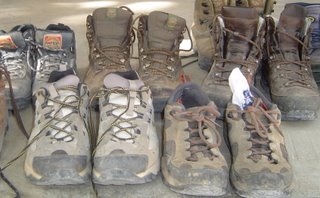
I arrived at the hostel at Los Arcos after my fifth day of walking the Camino de Santigo – the Way of St. James – the pilgrim route across the north of Spain. My fellow pilgrims were arriving alone and in groups of two or three. Many of them had walking sticks; a few of them were limping due to blisters they had developed along the trail.
Each person approached the desk set up in front of the hostel and presented his or her official pilgrim certificate. The host welcomed them and invited them to have a nut from a plate on the desk. He then stamped their certificate to show that they had come through this town – each town had a unique stamp. At the end of the Camino several hundred miles down the road, at the cathedral of Santiago de Campostella, each pilgrim could present his credential in order to qualify for a special blessing of pilgrims.
After registering at the hostel, each person would leave his shoes or boots on the porch. There were perhaps thirty pairs when I arrived, each pair showing evidence of several days of walking in the mud and dust. People began to go inside where they would put their backpack next to a bunk bed and spread a bedroll on the mattress. Then they would take a shower, wash some clothes by hand, write a letter, or sit and chat.
Sitting in front of the hostel, I could hear a variety of languages – Spanish, Portuguese, French, German, English. Most of the Germans could speak English and the Brazilians could get by in Spanish.
There was a Spaniard from Cadiz, near Gibraltar. He had his shoes and socks off and was looking at the huge blisters on his heels. Actually, they were no longer blisters – the blisters had broken and he had tried to drain them and trim away the flesh so that they would heal – I had seen him working on his feet at the hostel the night before. Now you could see that he was left with deep open sores. He had told me earlier that he had had a tough day of walking at that he was planning to return home for a week or two so that he could spend some time healing before returning to the Camino. A Brazilian man, about sixty years old was talking to him in a loud voice, almost as if he had had a glass of wine or two. He spoke Spanish slowly and loudly and therefore I was able to understand him.
“They’re not so bad. I think you’ll be able to continue!”
“I don’t think so. It’s time for me to go home.”
“No. Not at all. They’ll be better in no time. You just need to rest overnight!”
“Whatever you say.”
“It’s really no problem.”
Other people nearby were grinning, amused by the false optimism of the Brazilian.
“It’s no problem for him,” I said to the Spaniard seated next to me.
Now the Brazilian launched into another topic. He was apparently extolling the virtues of some sort of liquor produced only in Brazil.
“It’s very good. Very strong. Sort of like grapa, but with a stronger finish. You must try it sometime.”
“Sounds interesting,” said the man from Cadiz, the one with the blisters.
“You know, there is something else we have in Brazil that’s better than what you will find anywhere else in the world. You know what it is?”
“Las brazileñas,” joked the Spaniard. “Brazilian women?”
The Brazilian started to explain that this wasn’t what he meant, but his speech was lost in the good-natured laughter from the rest of the group.
“Why are there so many Brazilians walking the Camino?” This from another Spaniard, one wearing a warm-up suit.
“It’s because we have a writer in Brazil – Paolo Quello – who walked the Camino and then wrote several books about it,
“So that’s why so many of you have come.”
“Yes, but I don’t find the Camino to be the way he described it. He’s a strange writer. It’s as if he’s writing about his dreams, nothing appears the way he has described it.”
“It’s like the American writer, Hemingway,” said the man with the warm-up suit. “He wrote about Pamplona and now all of the Americans come there.
I had been sitting with a copy of The Sun Also Rises, trying to read while listening to this conversation. “This is the book I’m reading right now – Hemingway’s book about Pamplona.”
“I like Hemingway,” said the Brazilian in his usual straightforward way. “He’s direct and clear, easy to understand. Not like those crazy dreams of Quello, who must have been on drugs.”
“Yes, Hemingway was just drinking all of the time,” I said.
“You’re American?” asked the man in the warm-ups.
“Yes, I’m from California. But I must leave now. I’m taking a bus to Logoño and then on to Madrid for my flight home. I don’t have time for any more walking.”
“Too bad. You won’t be able to walk the entire Camino.”
“Maybe like me, you’ll come back and finish some day,” said the man with the blistered feet.
“I hope so.”
“Where are you from in California? asked the man in the warm-up suit.
“Near San Francisco.”
“I’ve been there. I have a friend in Santa Rosa who I visited once.”
“Really? That’s very near to my home.”
I stood up to leave, putting Hemingway in my back pocket. I looked at the group and they looked at me. “Buen Camino,” I said.
“Gracias,” they answered. “Buen Viaje – have a good journey home.”
I hoisted my backpack, remembering how to walk in such a way that my blisters and sore legs hurt the least, and headed toward the bus stop.

0 Comments:
Post a Comment
<< Home